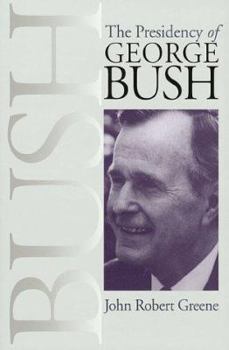The Presidency of George Bush
(Part of the American Presidency Series Series)
Select Format
Select Condition 
Book Overview
How could a president have won a war and lost a reelection? For George Bush, being Commander in Chief during Desert Storm was not enough. Domestic issues, personality factors, and the vagaries of the 1992 campaign confined his presidency to a single term. John Robert Greene helps us understand why. This first comprehensive history of George Bush's administration paints a striking portrait of a "positive moderate" whose accomplishments are often underrated. Greene's is the first book to make use of the entire range of literature on the forty-first president--including the Bush Papers at the George Bush Presidential Library at Texas A&M University--and draws on key interviews with members of his administration and with George Bush himself. Greene sets Bush's presidency in the context of the Reagan years and reviews not only his foreign policy successes--notably the war with Iraq and an improved relationship with Russia--but also key domestic issues: economic recession, the much maligned "Read My Lips" tax hike, Clarence Thomas's controversial Supreme Court appointment, and the enactment of bills that protected the environment and improved the lives of disabled Americans. Greene also offers an insightful analysis of Bush's bid for reelection, describing a campaign that saw conservatives abandoning Bush in droves while early signs of an economic upturn did little to defuse the Democrats' advantage. Greene is particularly insightful on Bush the person, depicting the president as a man of patience and prudence who placed great value on loyalty and who was better at managing crises than he was the day-to-day demands of the presidency. He shows us the sense of humor and love of the outdoors in a man often branded an elitist or a wimp, who ultimately was never able to manipulate his public image to his advantage. The Presidency of George Bush takes into account the many facets of the Bush administration, from the spirited optimism of a thousand points of light to the unsettling vagueness of "the vision thing," and shows us a man whose careful stewardship set the tone for post-Cold War foreign policy. As Greene notes, while Bush had his critics, it was on his watch that the Cold War ended and America reasserted its military might.
Format:Hardcover
Language:English
ISBN:0700609938
ISBN13:9780700609932
Release Date:January 2000
Publisher:University Press of Kansas
Length:264 Pages
Weight:1.25 lbs.
Dimensions:1.0" x 6.3" x 9.3"
Customer Reviews
1 rating
Excellent look at Bush 41 Presidency
Published by Thriftbooks.com User , 17 years ago
I read this book for a graduate class in American history. George Bush is something of an enigma to the American public. His privileged life afforded him the opportunity to pursue a career that was both rewarding and volatile. His passion for government was profiled in his commitment to reach the presidency. Once he achieved that goal he worked fervently to make as many positive changes and improvements for the nation as possible. George Bush had big shoes to fill after Ronald Reagan completed his two terms as President. Reagan cut taxes with his "Supply Side Economics" and created the greatest buildup of arms in American history. The 1980's turned into an age of entrepreneurism, cultural voyeurism, narcissism, and anxiety. Although President Reagan developed policies that were considered to be "revolutionary" he was not without inaccuracy. He stumbled in the Iran Contra affair by allowing White House aides to sell arms to Iran in order to gain support of Iran in the release of American hostages that were being held in Lebanon. While Reagan would be a tough act to follow, he left an unstable economy and social infrastructure behind. While President Bush had to suffer the consequences of the Iran-Contra affair, he promoted ethics throughout his administration. When he first got into office he put the "Scrub" Team" together which was responsible for "scrubbing" all potential appointments to make sure their loyalties were to Bush and not Reagan. Bush's eldest son, George W. chaired the group (46). The New York Times nicknamed the Bush administration "The Untouchables" after the incorruptible team of federal agents who chased gangsters during prohibition because of Bush's promise to make his administration more ethical than Reagan's (54). When Bush began his presidency he knew he had to pick his battles. He was successful in doing so in that he vetoed 44 bills and 43 were upheld in four years (62). He addressed the difficult and important issues of abortion, education, and drug policy. He also had to compensate for Reaganomics which left him with a budget deficit that hindered his administration from instituting new policies and programs due to insufficient funds. The deficit was also responsible for him compromising the one big pledge he made during his campaign "no new taxes". This would playa major role in his next election. President Bush's stronger attribute was foreign policy. He had agreed with little of Reagan's foreign policy. An example of this was his relationship with Mikhail Gorbachev of the U.S.S.R.; however, Bush chose to apply the brakes to the Soviet-American relationship, pull over to the side of the road, and study the map for a while." (90) Although Bush moved at his own pace, he stepped up the pace after the Tiananmen Square massacre. Due to the handling of the massacre by the People's Republic of China, Bush imposed sanctions on the country. President Bush's pace was not an issue when DESERT SHIELD was instituted. Saddam





